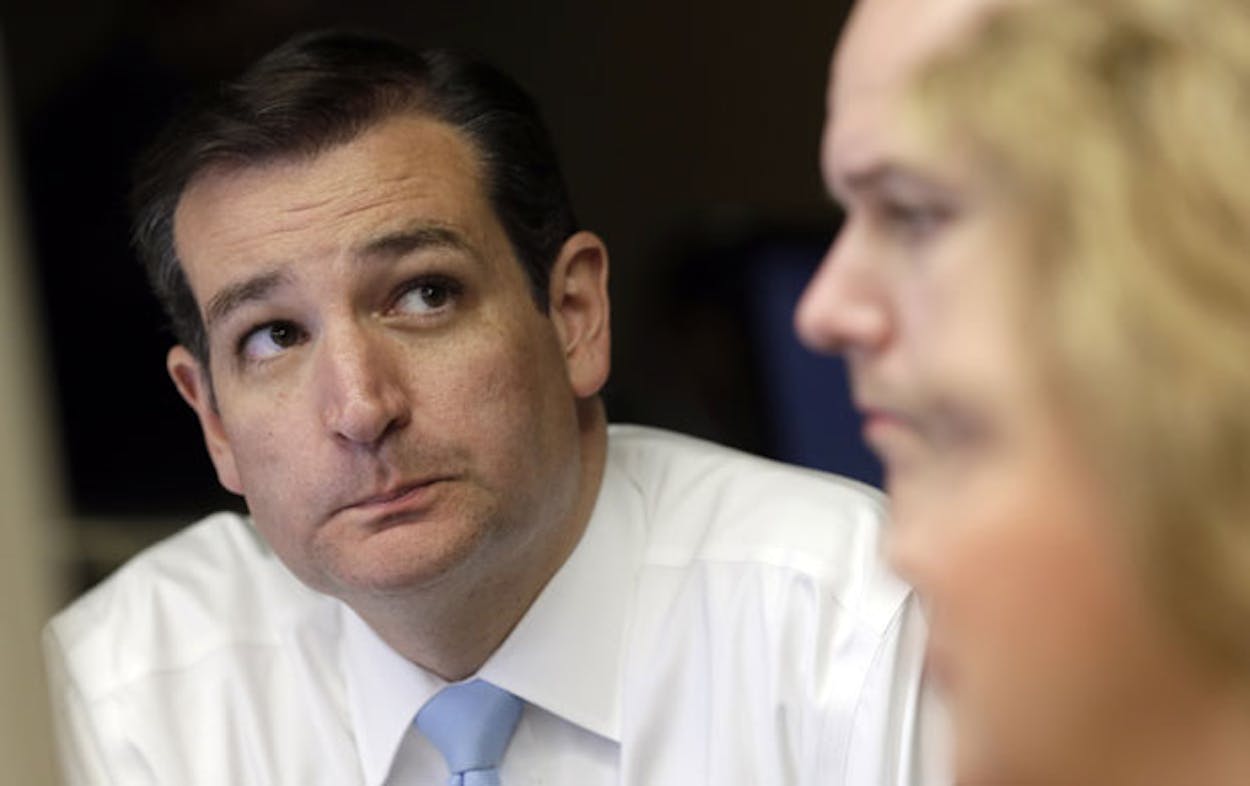Is Ted Cruz, buoyed by his rise to the U.S. Senate, now trying to build up his national profile in hopes of running for president in 2016? Here are some of the headlines following Cruz’s Thursday night speech at the American Principles Project’s $300-a-plate dinner in Washington:
“Ted Cruz Speech Fuels 2016 Presidential Run Speculation” (Fox News Latino), “Is Ted Cruz Running for President?” (Commentary), “Ted Cruz and 2016?” (NBC’s First Read), “Ted Cruz on a roll for 2016?” (Beaumont Enterprise), and “Ted Cruz For President In 2016?” (KEYE). And that’s just a handful. (To be fair, this publication also ran a piece in August titled “Ted Cruz for President?” after he scored his RNC speaking slot.)
Cruz used his Friday speech as an opportunity to unpack why the Republican Party lost on many fronts in 2012:
It wasn’t as the media would tell you: because the American people embraced big government, Barack Obama’s spending and debt and taxes. That wasn’t what happened. I’m going to suggest to you a very simple reason why we lost the election: We didn’t win the argument. We didn’t even make the argument.
The Republican Party doesn’t need to overhaul its platform; it simply needs to better shape its message, Cruz said, according to Politico‘s David Catanese. “We need to embrace what I call ‘Opportunity Conservatism.’ We need to conceptualize, we need to articulate conservative domestic policy with a laser focus on opportunity, on easing the means of ascent up the economic ladder,” Cruz said. The subtext, of course, was that Cruz might be the man for embracing such an ideology on the national stage.
Catanese noted in his coverage of the speech that Cruz blamed Romney’s lackluster showing with Hispanics on his “47 percent” remarks. But Slate’s David Weigel opined that Cruz’s that explanation just doesn’t square with reality: “The problem, as it pertains to Hispanic votes, is that it isn’t true. On August 22, two weeks before the ’47 percent’ tape was leaked by Mother Jones, the NBC/Univision poll checked how Romney was doing with Hispanics. Terribly!” In that poll, Hispanics preferred Obama to Romney by 63 to 28 percent.
At the Atlantic, Molly Ball declared that Cruz, who has the “vocal cadence of a Texas country preacher,” is coming to Washington to find his party still reeling from the drubbing it took in the 2012 elections:
It is a funny time to be Ted Cruz, a Tea Party hero and 41-year-old Cuban-American up-and-comer. He defeated an establishment Republican in a brutal Texas primary in what would prove to be conservatives’ rare bright spot of 2012. Now Mr. Tea Party has come to Washington only to find his party in the dumps, demoralized and groping for answers. He is a rising star in a firmament whose lights have dimmed.
Is Cruz signaling too much too soon, and is the media just as over-eager to speculate? For his part, Commentary‘s Jonathan S. Tobin fell firmly in the “too soon for the 2016 talk” camp:
To say that he may be getting ahead of himself is fairly obvious. Cruz has yet to demonstrate that he can be a force on the national stage. And even if he does become a leading voice for conservatives, he’ll have plenty of competition with names like Rubio, Chris Christie, Paul Ryan, Bobby Jindal, Rand Paul and Jeb Bush, just to name the most prominent possible nominees. However, no one should be laughing at Cruz’s pretensions if indeed he really is already thinking big. As a landslide winner in the nation’s most important red state, the affection of the party’s conservative base and a Hispanic identity, a Cruz candidacy must almost by definition be considered a likely first-tier candidate in GOP primaries. …
Nevertheless, any craze for Cruz is premature. … A lot can change in the next three years and we have no idea what issues or candidates will come to the fore by then. But the interest in the Texan should remind observers that any notion that the field for 2016 is already set is nonsense.
- More About:
- Politics & Policy
- Tea Party
- Ted Cruz







